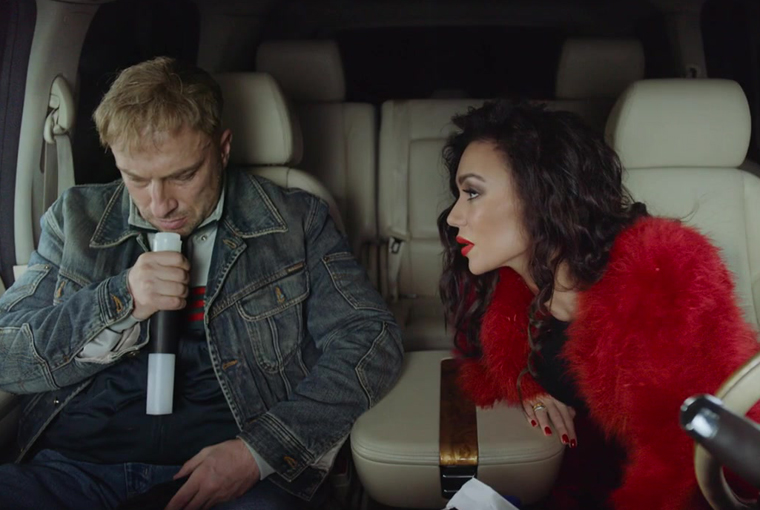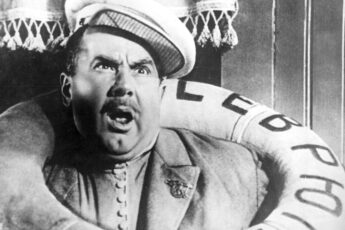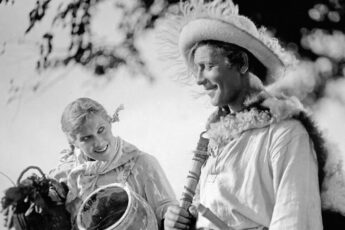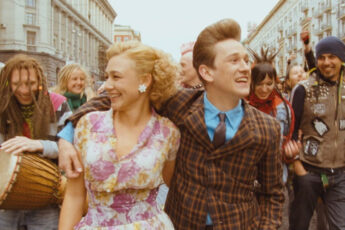A Traditional Karaoke Musical
Zhora Kryzhovnikov’s Best Day Ever (Samyy luchshiy den, 2015)
Vol. 110 (December 2020) by Rachel Stauffer
Zhora Kryzhovnikov’s film Best Day Ever was the top-grossing film in Russia in 2015.1 The film’s soundtrack spans the Stagnation period from the mid-to late 1970s through to the 2010s, featuring popular Russian-language songs. Born in 1979, Kryzhovnikov’s life to date seems to have influenced the choice of the songs from the late Soviet period, the glasnost’ and perestroika era, and the Yeltsin and Putin years. It is no coincidence that the film was released on December 24th, because Best Day Ever also belongs to the category of the traditional winter holiday movie known as the New Year film (novogodnij film).2 The most popular Soviet New Year film of all is probably Eldar Riazanov’s The Irony of Fate (Ironija sudby, ili s lohkym parom!), released in 1976. The film remains a mainstay among movies watched ritually during the winter holiday season in the Russian Federation and Russian-speaking diaspora, specifically, traditionally, and for many, obligatorily, on New Year’s Eve.3 In Best Day Ever, Kryzhovnikov is willingly influenced by Riazanov, and also Leonid Gaidai, directors of the most popular Stagnation-era comedies that prominently featured music, such as Riazanov’s Office Romance (Sluzhebnyy roman) and Gaidai’s Ivan Vasilievich Changes Profession (Ivan Vasilyevich menyayet professiyu).
Just as music brings together the two main characters in The Irony of Fate, music has a unifying objective in Kryzhovnikov’s film. According to the director himself, besides being a New Year film, Best Day Ever is both a karaoke comedy (karaoke komedija) and a musical comedy (musikalnaja komedija) in which the characters sing in situations of high emotional significance. In the director’s view, Best Day Ever follows the traditions of the type of musical comedy made popular by Ryazanov and Gaidai. In Kryzhovnikov’s film, however, the singing is restricted to believable scenarios in which “it occurs naturally”.4
The analysis of the Best Day Ever’s music in the present essay suggests that the soundtrack of Kryzhovnikov’s film serves three purposes. First, the music takes up a narrative function, framing and bringing together the shared cultural history among multiple generations of Russians. Second, the soundtrack bridges the gap between the 20th and 21st centuries, the late Soviet and post-Soviet periods, and traditional and modern spiritual culture, particularly concerning engagement and wedding rituals. Third, the soundtrack engages the audience in this karaoke comedy, as well as the characters in Best Day Ever, to sing along, which breaks the fourth wall, bringing viewers onboard with an intent of provoking solidarity among them. These three elements combine and create a unique approach towards the use of music to serve multiple functions, and intentionally involve the spectator. As Gianetti notes, “Pudovkin and Eisenstein insisted that music must never serve merely as accompaniment: It ought to retain its own integrity”.5 By virtue of implementing the philosophy of two of Russia’s most influential filmmakers regarding the use of music in Best Day Ever, Kryzhovnikov observes another longstanding practice of Russian film directors.
The plot of Best Day Ever is inspired by Alexander Ostrovsky’s 1860 play, An Old Friend is Better than Two New Ones (Stary drug luchshe novykh dvukh), but with modern twists. Instead of working as a counselor, main character Petya Vasutin (played by Dmitrii Nagiev) is a traffic cop. The object of his affection, Olya (played by Kryzhovnikov’s real-life wife, Yuliya Alexandrova), works at a gas station managed by her mother. The gas station where Olya and her mother work serves as the quotidian setting of several scenes throughout, especially in the important scenes at the film’s beginning and end. Vasutin’s family includes his mother Liuba (Irina Churikova), his father Gena (played by musician Mikhail Boyarsky, whose music is featured prominently in the film), and his brother Valya (Sergei Lavigin). The family run a restaurant and auto repair shop, which also serves as a backdrop for the action of the film. Petya is a heavy drinker, signified at the film’s outset by his drunken stumbling as he sees Olya, dressed in white, for the first time, and calls her “Snegurochka” or “Snow Maiden”, recalling winter ritual, Russian folklore, and Soviet children’s books and cartoons. This also sets the stage for the film’s categorization as a New Year film, since the first word uttered on-screen is “Snegurochka”. Prematurely, a drunk Petya asks Olya to marry him, an offer she immediately declines. She turns back around though when she hears Petya begin to sing the first lines of “A Ray of Golden Sunlight” from the 1973 cartoon On the Trail of the Bremen Town Musicians (Po sledam bremenskikh muzykantov). Thus, it becomes Petya’s mission to woo Olya with song. Subsequently, music fills in for dialogue in this scene, a use of song that is observable throughout Best Day Ever. The harpsichord-based theme from Georgyi Daniela’s 1975 film Afonya is used in this opening scene and in several other scenes throughout the film, mostly at times when Petya has fallen off the wagon, or when drunken shenanigans are taking place, both of which allude to the title character’s drunken behavior in Afonya.
Petya stops drinking for Olya and the two become a couple. Petya proposes for real, and Olya accepts. A calamity of circumstances on the day of their engagement, however, leads Petya to drink and break several months of sobriety and fidelity. As he’s sitting in his police car, an SUV driven by a celebrity visiting from Moscow, Alina Shopot (played by Olga Seryabkina, a former member of the 2000s popular musical ensemble Serebro), gently hits Petya’s car with her SUV on purpose as the song “Mama Liuba” by Serebro plays on the radio. After some witty chit-chat, Shopot makes Petya drive her home. The theme from Afonya plays as he drives Shopot home, where he accidentally leaves behind his nightstick. He realizes this at his family’s restaurant/auto shop, and the theme plays again as he realizes he has to go back to Shopot’s house, where she persuades him to have a drink. After Vasutin has taken his first sip, the music to the song “Best Day Ever” plays as a backdrop to Shopot and Vasutin’s drunken antics. Towards the end of the song, Petya stops singing, looks directly into the camera, and the lyrics appear, encouraging the audience to sing along. The song “Best Day Ever” is from 2011, written and originally performed by Grigory Leps.6 The characters in the film break the fourth wall several times throughout the film to encourage the audience to sing along karaoke-style to the lyrics captioned on-screen. Kryzhovnikov notes that this was an intentional attempt to unify viewers: “The important thing is that we’re trying to get people to come together so that the viewers in the theater feel as one. This can only be accomplished with people through music, song”.7 The title song, of course, holds unique significance, and repeats throughout the film. As is the case with the theme to Afonya, this is often done when Petya has been drinking. Leps has a history of alcoholism, and in fact, according to Antonova, Leps “is famous for crooning soft-rock ballads and for his bad-guy-gone-good image”.8 This description could also be applied to Petya Vasutin, who sings Best Day Ever repeatedly in the film.
As Petya’s day is unfolding, Olya enjoys the thrill of being a newly engaged woman. As she rides her bike through town on her way to the gas station, she sings along to Fabrika’s 2011 hit “Don’t Be Born Beautiful” (“Ne rodis’ krasivoj”). Though the song is modern, its lyrics reference Russian traditions and rituals. For instance, the song refers to the traditional practice of a single woman wearing one braid to represent her father, and of adding another braid for her husband upon marrying. Olya sings this song while it plays through her headphones, her long hair flowing behind her as she meets brides throughout the city and flashes her engagement ring. Olya’s bike ride around town to this song not only emphasizes her excitement about her engagement, but also sets up the music video for the song, which features the members of the group Fabrika in wedding dresses.
Eventually realizing that Petya is missing, Olya goes to see his mother Liuba. Liuba does not know about their engagement and thinks Olya has gone crazy. Despite that, Petya’s family realizes that he has fallen off the wagon, and they don’t know how to find him. Distraught, Valya goes to a bar and starts singing the karaoke version of Mikhail Boyarsky’s 1988 song of despair, “Green-Eyed Taxi” (“Zelenoglazoe taksi”). Valya’s karaoke performance, which includes lyrics for the audience, transitions to an electronic remix of the song, performed by Seryabkina.9 Pin-up style stills and magazine covers of Alina Shopot animate as the song plays, and at one point her image is passed around a sea of men, affirming that Shopot is a sex symbol worshipped on a commercial level, but unable to sustain individual relationships. She constantly asks for Petya’s company, for example, because she says she’s lonely. As “Green-Eyed Taxi” plays, several different scenes also advance the plot in a Hollywood-style montage. After this, Alina, joined by Valya and Gena, start another epic day of drinking, bringing a hungover Petya along for the ride. Another montage of the foursome on a joyride, drinking, dancing, and eventually driving into a river, is accompanied by the Serebro song “Mama Liuba”, which was first playing when Shopot initially met Petya.
The theme song from Afonya plays again, this time as Olya’s friend Anzhela walks to the gas station to report on Petya’s activities as seen through Shopot’s social media accounts, which she has been updating with photos of her and Petya. Olya sees Petya carrying Alina Shopot to her house and assumes the worst, even though Petya is trying to get her to take him to the gas station to talk to Olya. Shopot, trying to get him to stay, gives him a drink to help him have the confidence to win Olya back. But soon enough, Petya is again singing “Best Day Ever” at Shopot’s house. Olya, seeing and hearing the two of them together, decides to take it out on Petya’s police car, a scene interwoven with Olya and her friend Anzhela singing Anna German’s 1977 song “When the Gardens Bloomed” (“Kogda cveli sady”) in a karaoke bar to lament that Petya has cheated on her with Shopot. The words to German’s song are about a young woman’s first love. Replete with gratuitous descriptions of early spring as a metaphor for a young woman’s emergent sexuality, this song is influenced by both folk and popular music traditions from Russia.
A 1970s American disco anthem also makes an appearance in Best Day Ever. Olya sees footage of Petya with Alina Shopot on TV as Shopot announces she and Petya are getting married. Distraught, and then angry, Olya walks out onto the roof outside her bedroom window and jumps onto a kayak on top of a truck, which drives her a short distance as she begins singing Gloria Gaynor’s 1978 song, “I Will Survive”. A brass ensemble of women of color and an entire marching band eventually accompany Olga’s performance, which turns into an important turning point in the film when it seems that Olya and Petya will never get together again. The lyrics to “I Will Survive” appear on-screen in English for the audience to sing along, and this is the first time that Olya breaks the fourth wall to encourage the audience to join the singing. Petya and Olya break up officially, and Petya’s family shows up at Alina Shopot’s house for the engagement ritual, only to find she is returning to Moscow and totally uninterested in marrying Petya Vasutin. Petya’s father, Gena, played by Mikhail Boyarsky, tells Petya that Olya was the right woman for him, and afterwards quietly sings and plays a brief prelude of the film’s big culminating number on the accordion, Boyarsky’s own 1992 song, “Thank you, my dear” (“Spasibo, rodnaja”). Desperate to win back Olya’s affections, Petya heads to the gas station. While there are a few additional musical numbers that merit discussion in this film, including a heavily choreographed scene of women in tights and leotards twerking on cars at the gas station, the film’s culminating scene warrants special attention. The theme from Afonya also makes another appearance before this final scene, again alluding to Petya’s problems, wrought out of unnecessary drunkenness.
The final scene of Best Day Ever, and that of most New Year films, is a wedding, in the Proppian sense. Propp identified the wedding as serving a conclusory function in the Russian fairy tale, and New Year films often end this way.10 Importantly, for the function to take hold, it is enough that a wedding is planned but does not materialize. During the musical number at the end of Best Day Ever, Olya accepts Petya’s and Petya’s family’s proposal, unlike Alina Shopot, who mocks the traditional Russian engagement rituals, emphatically rejecting not only Petya and his family, but also traditional Russian culture. In contrast to Shopot’s rejection, Olya’s acceptance of Petya’s proposal marks her as a representative of a cinematic Russian feminine ideal. The song “Thank You, Dear”, (“Spasibo, rodnaja”) is performed by Boyarsky, who plays Petya’s father Gena, which also brings to mind the accordion-playing song stylings of the famous crocodile Gena from the wildly popular Soviet cartoon Cheburashka. The song is given a Bollywood makeover, however, with the film’s only Central Asian character, a guest worker named Qasim, played by a Kazakh actor, playing a sitar and leading the transition from Russian traditional accordions and vocal music to a fast and South Asian-influenced beat that shapes the final Bollywood-style wedding dance. Clearly the cultural appropriation is a bit of a problem, but it is the view of this author that it is unintentional, and that the director is paying homage to Bollywood cinema, which did experience popularity during the late Stagnation period, as noted by Chapman.11
In a film that is reconciling the past in terms of tradition versus modernity, it is no surprise that the film’s music is intentionally recognizable, both combining and representing Russia’s Soviet past, the uncertainty of the 1990s, and the bold pop music inventions of the 2000s and 2010s. The final scene of the film reinterprets Mikhail Boyarsky’s 1993 song “Thank You, Dear” into an accompaniment for a Bollywood-style wedding finale, suggesting that the past and the present can coexist, and that Russia itself has its own coming-of-age story to tell. The generational and societal divides among the characters reflect the aim of the film’s karaoke comedy innovation, which serves as a bridge between generational cultural norms; those of the parents of Petya and Olya, and those of Petya and Olya themselves. Additionally, these were all times of considerable political and economic transformation in the Soviet Union and in post-Soviet spaces. Ultimately, the film Best Day Ever reveals and reinforces the influence of the Soviet past and of the transformational 80s, 90s, and 2000s on the present. By reconciling past cultural norms with the present through much-loved songs, multiple generations are brought together with the power of music.
References
- 1.In this paper, the film’s title has been translated by the author as “Best Day Ever’’, but it is often literally translated as “The Very Best Day’’. The informal style of the film warrants a more colloquial English rendering.
- 2.DeBlasio, A. (2008). The new-year film as a genre of post-war Russian cinema. Studies in Russian and Soviet Cinema, 2(1), 43-61; 43.
- 3.Prokhorova, E. (2013). Cinema of stagnation late 1960s-1985. In R. Salys (Ed.), The Russian cinema reader (104-113). Boston: Academic Studies Press, 109.
- 4.Horev, V. (2015, October 29). Жора Крыжовников: Коллеги спрашивают меня: Как вы это сделали?. Teleprogramma.pro. https://teleprogramma.pro/cinema-stop/28330/ [Accessed on 31st of December 2020, translated by author].
- 5.Gianetti, L. (2011). Understanding movies. Boston: Allyn & Bacon, 213.
- 6.Kryzhovnikov also included Leps’ 1995 Yeltsin-era hit “Natali’’ (“Natali’’) in his 2012 film Kiss Them All! (Gorko!).
- 7.Horev, V. 2015.
- 8.Antonova, M. (2014, January/February). Crooner blacklisted. Russian Life, 57(1), 8-10; 11.
- 9.The remix of the song “Green-Eyed Taxi’’ by Oleg Kvasha was also featured in the popular video game Grand Theft Auto IV.
- 10.Propp, V. (1968). Morphology of the folktale. Trans. Laurence Scott, revised Louis A. Wagner. Austin, TX: University of Texas Press.
- 11.Chapman, A. (2013, July 1). Performing “Soviet’’ film classics: Tajik Jimmy and the aural remnants of Indian cinema. Studies in Russian & Soviet Cinema, 7(2), 227-242; 230.




Leave a Comment